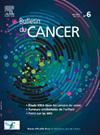Caractérisation moléculaire des cancers du poumon : mise au point et recommandations
IF 1.1
4区 医学
Q4 ONCOLOGY
引用次数: 0
Abstract
Les analyses moléculaires sont devenues indispensables à la prise en charge des cancers bronchiques non à petites cellules aux différents stades de la maladie. Il existe des recommandations de caractérisation moléculaire des tumeurs, nationales et internationales, régulièrement mises à jour. Dans cette revue, nous ferons le point sur les altérations oncogéniques (mutations, réarrangements de gènes) indispensables à rechercher et nous préciserons les limites inhérentes aux prélèvements et aux techniques de séquençage utilisés. Les biomarqueurs qui n'ont pas fait la preuve de leur utilité clinique en routine à ce jour ne seront pas détaillés ici.
Molecular testing of non-small cell lung cancers has become mandatory at all stages of the disease. National and international recommendations for molecular testing are up-dated regularly. In this review, we will summarize diagnostic approaches focusing on targetable oncogenic alterations (mutations, gene rearrangements) and we will indicate the limits currently associated with sample types and sequencing technologies. Biomarkers that have not showed routine clinical utility will not be presented here.
求助全文
约1分钟内获得全文
求助全文
来源期刊

Bulletin Du Cancer
医学-肿瘤学
CiteScore
1.90
自引率
16.70%
发文量
224
审稿时长
37 days
期刊介绍:
Without doubt, the ''Bulletin du Cancer'' is the French language publication of reference in the field of cancerology. Official organ of the French Society of Cancer, this journal covers all the information available, whether in the form of original articles or review articles, but also clinical cases and letters to the editor, including various disciplines as onco-hematology, solids tumors, medical oncology, pharmacology, epidemiology, biology as well as fundamental research in cancerology. The journal proposes a clinical and therapeutic approach of high scientific standard and regular updates in knowledge are thus made possible. Articles can be submitted in French or English.
 求助内容:
求助内容: 应助结果提醒方式:
应助结果提醒方式:


